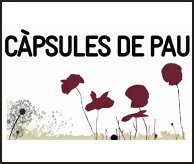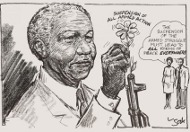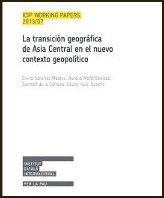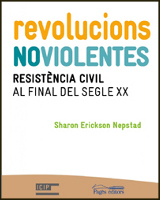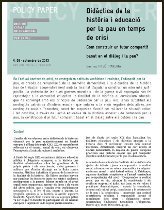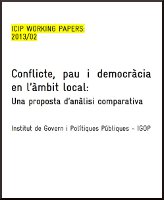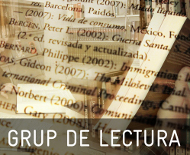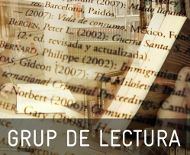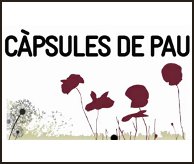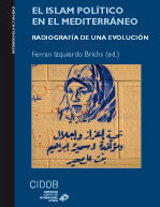A new video of the project ‘Peace Capsules’ , coproduced by ICIP and Col·lectiu Contrast, has been published this week on the ICIP website. It is a short one minute long video entitled ‘What is peace to Reina Sarkis?’ and in which Sarkis, psychoanalyst from Lebanon, considers what peace means to her. The video is accessible both on the ICIP website and on the ICIP Youtube channel .
From now and until the 21st September 2014, International Day of Peace, ICIP will publish a new video capsule each week. Each capsule will count with the participation of an activist, actor or academic who will think of what peace means to him/her. The aim of the project is to compile different approximations to the concept ‘peace’ on the ICIP web site.
Author: whads
The hidden truth about the conflict in the Sahara
The report analyses several cases of severe violations of human rights which have been committed in Western Sahara since 1975- when the territory was occupied by Morocco- to December 2010 – when the Moroccan army assaulted the Gdeim Izik a al-Aaiun Camp.
This study springs from 261 interviews to victims, either direct victims or their relatives, who have suffered the consequences of violence and political prosecution for defending the self-determination right of the territory and for questioning established power. They are corroborated testimonies of bombings, forced disappearances, common graves, arbitrary detentions, tortures in clandestine centers and sexual violence, among others.The report is filled with personal stories which give voice to a hidden history, a truth which has been denied for over 30 years, in an exercise of memory and justice.
The report is divided into two volumes. The first, analyses specific cases of violations of human rights such as the air raid on Um Dreiga in 1976, the 2005 intifada or the expulsion and hunger strike of Aminatou Haidar in 2009. The second volume records the impact of this violence, especially on women and children, and includes an agenda proposal for the transformation of the conflict. This agenda consists of a list of proposals such as the creation of specific transitional justice mechanisms; the investigation of the 407 cases of forced disappearances registered so far; the creation of assistance programs for the victims; the implementation of International Law and a change of attitude of the international community. In this respect, author Carlos Martin Beristain, PhD in Psychology, regretted that the Sahara conflict is ‘one of the most disregarded in the world’ and vindicated a more active attitude from the international community. Beristain stated that Sahara has always been perceived as a humanitarian aid problem and that we should focus on human rights to find a solution to the conflict.
The event also counted with the participation of Jaume Saura, president of the Human Rights Institute of Catalonia; Núria Salamé, president of the Catalan Association of Friends of the Saharawi people; Joan Merelo- Barberà, president of the Commission of International Criminal Law of the ICAB; and Tica Font, director of ICIP.
The hidden truth about the conflict in the Sahara
The report analyses several cases of severe violations of human rights which have been committed in Western Sahara since 1975- when the territory was occupied by Morocco- to December 2010 – when the Moroccan army assaulted the Gdeim Izik a al-Aaiun Camp.
This study springs from 261 interviews to victims, either direct victims or their relatives, who have suffered the consequences of violence and political prosecution for defending the self-determination right of the territory and for questioning established power. They are corroborated testimonies of bombings, forced disappearances, common graves, arbitrary detentions, tortures in clandestine centers and sexual violence, among others.The report is filled with personal stories which give voice to a hidden history, a truth which has been denied for over 30 years, in an exercise of memory and justice.
The report is divided into two volumes. The first, analyses specific cases of violations of human rights such as the air raid on Um Dreiga in 1976, the 2005 intifada or the expulsion and hunger strike of Aminatou Haidar in 2009. The second volume records the impact of this violence, especially on women and children, and includes an agenda proposal for the transformation of the conflict. This agenda consists of a list of proposals such as the creation of specific transitional justice mechanisms; the investigation of the 407 cases of forced disappearances registered so far; the creation of assistance programs for the victims; the implementation of International Law and a change of attitude of the international community. In this respect, author Carlos Martin Beristain, PhD in Psychology, regretted that the Sahara conflict is ‘one of the most disregarded in the world’ and vindicated a more active attitude from the international community. Beristain stated that Sahara has always been perceived as a humanitarian aid problem and that we should focus on human rights to find a solution to the conflict.
The event also counted with the participation of Jaume Saura, president of the Human Rights Institute of Catalonia; Núria Salamé, president of the Catalan Association of Friends of the Saharawi people; Joan Merelo- Barberà, president of the Commission of International Criminal Law of the ICAB; and Tica Font, director of ICIP.
Nelson Mandela (1918-2013) Special
Coinciding with the death of Nelson Mandela on December 5, ICIP has published a special dossier in memory of the first black president of South Africa, who was a symbol both of the struggle against apartheid and in favor of worldwide peace and human rights.
First of all, the dossier includes four articles (in Catalan) analyzing the figure of Madiba (as he was known in his country) from different perspectives. The first article addresses Mandela’s international legacy and his role as a peace mediator in various conflicts; the second article analyzes Mandela’s career in relation to reconciliation; the third article focuses on Nelson Mandela International Day, which the United Nations commemorates on July 18, and what it represents; and, finally, there is a fourth article that takes stock of Mandela’s career and the legacies he has left us with.
The dossier also includes a selection of websites dedicated to Mandela, with some of his most noted speeches, bibliography, filmography, images, quotes, etc. And, finally, the bibliography related to Nelson Mandela in the ICIP library is also available to users (Gran Via de les Corts Catalanes, 658, baixos, Barcelona).
‘La transición geográfica de Asia Central en el nuevo contexto geopolítico’
‘Nonviolent Revolutions: Civil Resistance in the Late 20th Century’ by Sharon Erickson Nepstad
The latest book in the ‘Nonviolence and the Struggle for Peace’ collection (published by ICIP and Pagès Editors) seeks to study the methodology and effectiveness of the nonviolent political movements of the last third of the 20th century. To do so, the author, Sharon Erickson Nepstad, has selected six types of nonviolent political mobilizations, which aimed to democratically transform authoritarian regimes. Of these six case studies, three were successful in the sense of leading to the removal of the political regime (East Germany, Chile and the Philippines), and three failed (the insurrection in China in the setting of the Tiananmen tragedy, the struggle of nonviolent groups in Kenya against the dictatorship of Daniel arap Moi, and the nonviolent pro-democracy mobilizations of the late 1980s in Panama, during the dictatorship of Manuel Antonio Noruega). The book focuses on the strategies and dynamics of the nonviolent movements, and on the different reactions of the dictatorial regimes in their efforts to counter the insurgencies. The author defines nonviolence as a form of grassroots civil resistance that makes use of social, economic and political confrontation without resorting to violence or to the threat of violence.
The author
Sharon Erickson Nepstad is Professor of Sociology at the University of New Mexico. Her research focuses on social movements, studies of civil resistance and nonviolence, and the sociology of religions. Her publications include the book Religion and War Resistance in the Plowshares Movement, which received an award from the American Sociological Association’s section on Peace, War and Social Conflict in 2009. She is currently studying nonviolence and the Arab Spring revolts.
The collection
The collection ‘Nonviolence and the Struggle for Peace’ aims to provide society, academia, and public administrations with instruments of reflection and action that demonstrate that nonviolence is desirable, viable and efficient.Gandhi avui (Gandhi and Beyond), by David Cortright; Els anomenats pacifistes (The So-called Pacifists), by John Paul Lederach; or Noviolència: història d’una idea perillosa(Nonviolence: The History of a Dangerous Idea), by Mark Kurlansky, are other books available in this collection.
History teaching and peace educaction in a time of crisis
‘Conflicte, pau i democràcia en l’àmbit local’
Registrations now open for a new edition of the ICIP reading group
The ICIP Training and Dissemination area is starting up a new edition of the ICIP reading group this fall, which will debate on the book On Violence , by Hannah Arendt, co published by ICIP and Angle Editorial within the collection ‘Classics of peace and nonviolence’.
The coordinator of this group will be Vicent Martínez Guzmán, Doctor of Philosophy and honorary director of the UNESCO Chair of Philosophy for Peace, and a promoter of Peace and Development Studies at various universities. This edition will be divided into four sessions (on the 12th, 19th and 26th November and the 3rd December) and it will take place from 6 to 8 PM, at the ICIP registered office (Gran Via de les Corts Catalanes 658, Barcelona).
The reading group is open to all (although seating is limited) and the complexity of the debates will depend on participants. Those interested in signing up can contact ICIP by sending an email to activitats.icip@gencat.cat or phoning 93 554 42 86.
Registrations now open for a new edition of the ICIP reading group
The ICIP Training and Dissemination area is starting up a new edition of the ICIP reading group this fall, which will debate on the book On Violence , by Hannah Arendt, co published by ICIP and Angle Editorial within the collection ‘Classics of peace and nonviolence’.
The coordinator of this group will be Vicent Martínez Guzmán, Doctor of Philosophy and honorary director of the UNESCO Chair of Philosophy for Peace, and a promoter of Peace and Development Studies at various universities. This edition will be divided into four sessions (on the 12th, 19th and 26th November and the 3rd December) and it will take place from 6 to 8 PM, at the ICIP registered office (Gran Via de les Corts Catalanes 658, Barcelona).
The reading group is open to all (although seating is limited) and the complexity of the debates will depend on participants. Those interested in signing up can contact ICIP by sending an email to activitats.icip@gencat.cat or phoning 93 554 42 86.
What is Peace to Antoine Messarra?
A new video of the project ‘Peace Capsules’ , coproduced by ICIP and Col·lectiu Contrast, has been published this week on the ICIP website. It is a short one minute long video entitled ‘What is Peace to Antoine Messarra?’ and in which Messarra, journalist and political analyst from Lebanon, considers what peace means to him. The video is accessible both on the ICIP website and on the ICIP Youtube Channel .
Until the 21st September 2014, International Day of Peace, ICIP will publish a new video capsule each week. Each capsule will count with the participation of an activist, actor or academic who will think of what peace means to him/her. The aim of the project is to compile different approximations to the concept ‘peace’ on the ICIP web site.
‘El islam politico en el Mediterráneo’ (Political Islam in the Mediterranean)
The book El islam politico en el Mediterráneo. Radiografía de una evolución (Political Islam in the Mediterranean. In-depth Analysis of an evolution), by Editor Ferran Izquierdo and published by CIDOB, analyses the major Islamist groups present in the Mediterranean region at a moment of radical change in the Arab politics as consequence of the popular revolts that sprung in 2011. Those revolts were the cause of the fall of the totalitarian regimes in Tunisia, Egypt, Libya and Yemen, and opened the transition processes in Syria and the constitutional changes process in Morocco.
The book is partly the result of two research projects which have been financed by ICIP: Factor religiós i conflictes violents al Nord d’Àfrica, Orient Mitjà i Turquia: Presència i visibilitat a Catalunya des d’una perspectiva comparada and Les revoltes àrabs. De la violència unilateral a la guerra: Participació i impacte de l’Islam polític, RI-ICIP 2011; both coordinated by Ferran Izquierdo, Professor of International Relations at the Universitat Autònoma.
The title is part of the CIDOB Book Collection ‘Interrogar la actualidad’ (Questioning Current Affairs).

